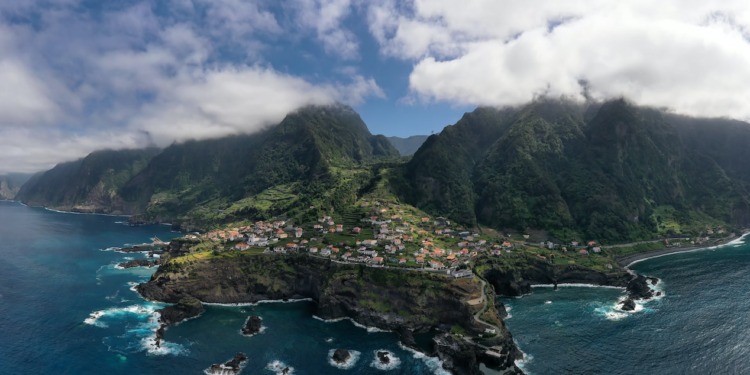Nestled in the expanse of the Atlantic Ocean, Madeira stands as a natural paradise. The archipelago, one of Portugal’s autonomous regions, boasts a lush and dramatic landscape shaped by ancient volcanic eruptions. Madeira is comprised of four islands, located only 660 kilometers off the west coast of Africa. However, Madeira has not only captivated tourists with its natural beauty but is also drawing attention as a trailblazer in renewable energy initiatives.
Overcoming Challenges: Isolation and Terrain
The island’s status as the outermost region of Europe presented unique obstacles in terms of energy system isolation. Being disconnected from the continental power grid meant the island had to find self-reliant solutions to meet its energy demands. Additionally, Madeira’s rugged terrain and mountainous landscape posed considerable construction challenges. Digging tunnels and building the necessary infrastructure in such challenging conditions required ingenuity and perseverance.
Despite these hurdles, Madeira’s determination ultimately paid off thanks to European Union’s post-pandemic funds. These investments led to the development of a highly efficient and independent renewable energy infrastructure.
Ancient Ingenuity: The Power of Levadas
With an ambitious plan to generate 50% of its electricity from renewable sources in the next years, Madeira harnesses the power of its unique characteristics and rich history. At the core of the region’s success lies an ancient water transportation system called Levadas. Dating back to the 15th century, Levadas are kilometers-long stone pipes that transport rainwater from the north to the drier and warmer south. The water flows through the pipes and a 5.4-kilometre tunnel stores it. Moreover, the tunnel brings water through the Socorridos hydroelectric power station, where it serves a dual purpose. The water from the power station is treated for human consumption and agricultural use but also generates clean energy.
Some #Wind & #Solar farms up on the hills near #MadeiraAirport here on @Madeira Island …#Renewables #EnergyTransition#EnergySecurity pic.twitter.com/DXhSf3gZgS
— Kevin O'Donovan (@Kevin_ODonovan) October 1, 2022
Diversifying Renewable Energy Sources
Apart from the Levadas, Madeira has integrated wind power to supplement its water transportation system. The island maximizes its energy capabilities by storing water during off-peak times and using it to generate electricity during high-demand periods. In doing so, Madeira ensures a reliable supply of energy. This clever combination of ancient water transportation and modern wind energy highlights the island’s innovative and adaptable approach to renewable energy.
RELATED ARTICLES: Industrial Action: A Threat to the Environment? | Workers’ Unions Win in the US and UK: Upsurge or Blip? | CO2Rail, Using Rail-based Direct Air Capture To Get To NetZero | Passenger Rail, Maglev and the Future of Transit
EU Funding: A Game Changer
Madeira Island’s remarkable progress in renewable energy owes much to a multi-million euro project co-funded by the European Union. The project aimed to optimize the island’s energy production and storage capabilities, propelling its renewable energy capacity to new heights. Despite challenges in its implementation, the region’s efforts have been met with tremendous success. The EU co-funded project has earned Madeira well-deserved recognition at the EGIOSTAR Awards. This prestigious yearly competition organized by the EU Commission’s Directorate General Region and Urban Policies commended the island’s project as one of the best EU co-funded initiatives in the last 15 years. This recognition solidifies Madeira’s position as a role model for renewable energy in the EU.
The Impact of Renewable Energy
Madeira’s commitment to renewable energy has yielded far-reaching impacts on both its society and the environment. By embracing clean energy sources, the island has achieved greater energy independence and reduced its reliance on fossil fuels. This transition has helped mitigate traditional energy generation’s environmental impact and strengthened Madeira’s resilience against energy supply shocks.
Furthermore, Madeira’s renewable energy initiatives have created job opportunities and supported economic growth on the island. Developing and maintaining renewable energy infrastructure have opened new avenues for employment, fostering a stronger local economy. Additionally, local farmers from drier regions can count on more reliable water distribution.
What the Future Looks Like
Madeira’s goal of achieving 50% renewable electricity generation is promising. Looking ahead, the island remains steadfast in its commitment to renewable energy. With further investments, it aims to position itself as a model for other regions seeking to make a sustainable transition.
Most importantly, Madeira’s dedication to renewable energy plays a crucial role in combatting climate change. By reducing carbon emissions, the island contributes to global efforts to preserve the environment and combat the effects of climate change, which pose a significant threat to its picturesque landscapes and unique biodiversity. The island’s efforts demonstrate how a diversified approach to renewable energy can effectively meet the needs of different regions.
Madeira’s journey toward becoming a leader in renewable energy is a testament to the potential of harmonizing nature, innovation, and international cooperation. The use of Levadas, the integration of wind power, and the strategic use of stored water showcase the island’s commitment to sustainable practices. With a well-deserved reputation as the EU’s poster child for renewable energy, Madeira’s progress serves as a reminder that a cleaner and more sustainable future is indeed possible.
Editor’s Note: The opinions expressed here by the authors are their own, not those of Impakter.com. — In the Featured Photo: Aerial view of Seixal, a municipality in Madeira Island. Featured Photo Credit: Unsplash










